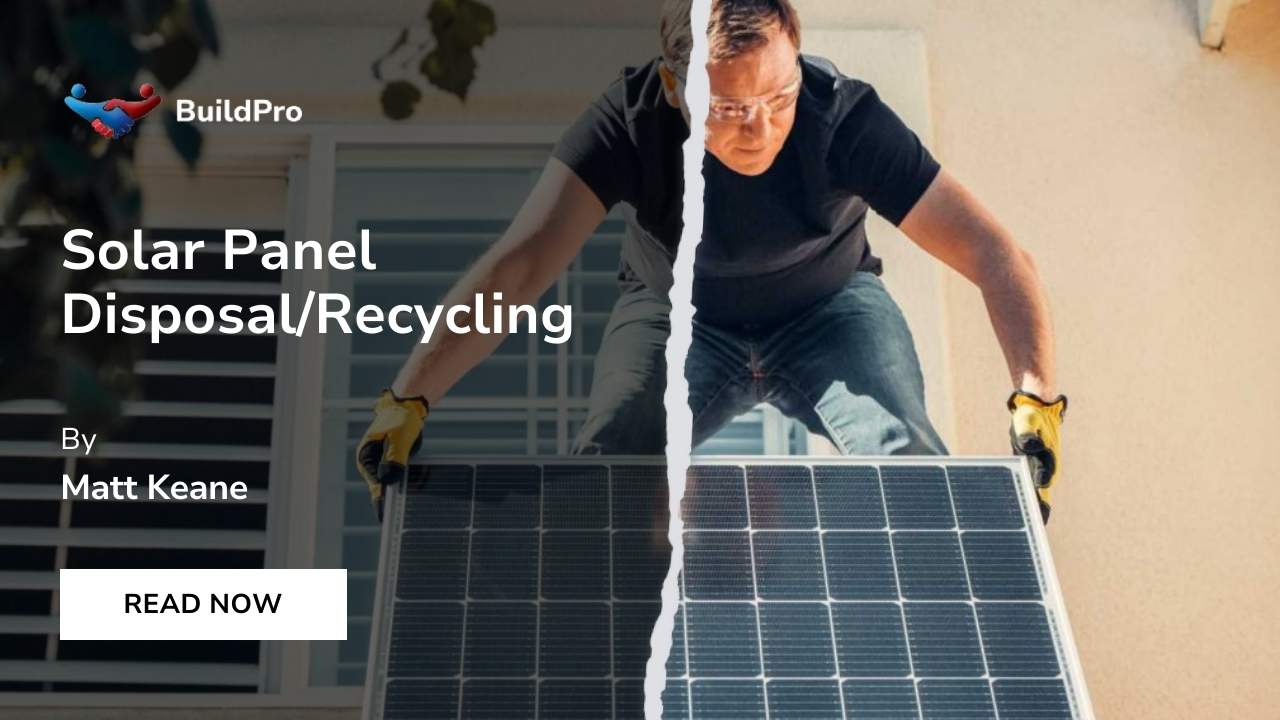Have you ever pondered what to do with your old or malfunctioning solar panels? We've been there too, and the solution is not as complicated as it may seem. In fact, 96% of a solar panel's parts can be reused or recycled! So, this informative Blog post will guide you through simple and environmental friendly methods for proper disposal and recycling of your solar panels.
So, let’s dig in; we promise it's simpler than you think!
Key Takeaways
- 96% of a solar panel's parts can be reused or recycled, making proper disposal and recycling important for environmental sustainability.
- Improper disposal of solar panels can harm the environment by polluting water and soil, releasing toxic substances, and taking up space in landfills.
- Solar panels contain toxic materials like lead and cadmium that can pose health risks if not handled properly, highlighting the need for responsible disposal methods.
- Recycling solar panels helps conserve resources like glass, plastic, and aluminium while reducing energy consumption and greenhouse gas emissions.
Importance of Properly Disposing or Recycling Solar Panels
Improper disposal or recycling of solar panels can have significant environmental impacts, pose potential health hazards, and hinder resource conservation efforts.
Environmental impact of improper disposal
Dumping solar panels the wrong way can hurt our planet. Tiny parts in panels can leak out and poison water or soil if not handled properly. The metals and glass in them take up space in landfills too.
And burning them lets toxic air into our skies. We must do everything we can to avoid this harm. Getting rid of old or broken panels the correct way is part of that job, for us and for a healthier world.
Potential health hazards
When it comes to the improper disposal or recycling of solar panels, there are potential health hazards that need to be considered. Solar panels contain toxic materials such as lead, cadmium, and various chemicals that can be harmful if not handled properly.
These substances can leach into soil and water sources, posing a risk to human health and the environment. It is important to dispose of solar panels through proper channels to ensure safe handling and minimise the potential for exposure to these hazardous materials.
Furthermore, recycling companies follow strict protocols to safely extract valuable components from solar panels while minimising the risks associated with their disposal. By choosing responsible methods for disposing of or recycling solar panels, we can protect both our own well-being and the health of our planet.
Resource conservation
Recycling solar panels is not just important for the environment and our health; it also helps us conserve valuable resources. When we properly dispose or recycle solar panels, we can recover materials like glass, plastic, and aluminium that can be used again in other industries.
This reduces the need to extract and manufacture new raw materials, saving energy and reducing greenhouse gas emissions. Additionally, recycling waste from end-of-life solar panels presents opportunities for recovering valuable materials like copper and aluminium.
By conserving resources through proper disposal and recycling of solar panels, we contribute to a more sustainable future while reducing our reliance on finite resources.
Methods of Properly Disposing or Recycling Solar Panels
To properly dispose or recycle solar panels, homeowners can give them to recycling companies, take them to hazardous waste collection facilities, or return them to solar energy manufacturing companies.
Giving them to recycling companies
Recycling companies play a crucial role in the proper disposal of solar panels. They work with manufacturers and installers to ensure that these panels are recycled safely and efficiently.
By giving your old solar panels to reputable recycling companies, you can contribute to minimising waste and preserving valuable resources. These companies have the expertise and equipment needed to dismantle the panels, separate their components (such as aluminium and copper), and recover valuable materials for reuse.
Furthermore, recycling your solar panels not only helps protect the environment but also supports job creation in the recycling industry.
Taking them to hazardous waste collection facilities
To properly dispose of solar panels, one option is to take them to hazardous waste collection facilities. These facilities are equipped to handle and safely dispose of materials that may be harmful to the environment or human health.
By taking your solar panels there, you can ensure that they are handled and disposed of in a responsible manner.
One important thing to note is that not all solar panels are considered hazardous waste. However, it's still a good idea to take them to these collection facilities just to be on the safe side.
This way, you can contribute to proper waste management practices and prevent any potential harm that may come from improper disposal.
At these hazardous waste collection facilities, experts will know how to handle the different components of solar panels correctly. They will separate out materials like glass, plastic, aluminium, and other valuable metals for recycling purposes.
So, they help conserve resources and reduce the environmental impact associated with solar panel waste.
Returning them to solar energy manufacturing companies
We can also return old solar panels to the companies that originally manufactured them. This allows the companies to properly handle the recycling process and recover valuable materials from the panels.
By returning these panels, we contribute to sustainable practices and support the growth of renewable energy industries. It's important to reach out to reputable dealers or manufacturers who offer solar panel recycling services so that we ensure our panels are disposed of in an environmentally friendly way.
Additionally, by returning our old solar panels, we can play a part in creating job opportunities within the recycling industry and help promote a greener future for all.
Process of Solar Panel Recycling
The process of solar panel recycling involves mechanical processing, thermal treatment, and silicone-based recycling. Find out more about these methods and how they contribute to a sustainable future for renewable energy.
Mechanical processing
To properly recycle solar panels, one of the key steps is mechanical processing. This involves dismantling the panels and separating their different components. The process starts by removing the junction box and frame from the panel.
Furthermore, aluminium and copper components are carefully extracted for further recycling. By breaking down the solar panels in this way, it becomes easier to recover valuable materials and ensure that they can be reused effectively.
Mechanical processing plays a crucial role in maximising resource conservation and minimising waste when it comes to solar panel disposal and recycling efforts in Ireland.
Thermal treatment
Thermal treatment is one of the methods used to properly dispose of or recycle solar panels. In this process, the panels are heated to high temperatures in order to remove any organic materials and separate the different components.
The heat helps break down the panel into its individual parts, such as glass, plastic, and metal. This allows these materials to be recycled and reused in other industries. Thermal treatment is an effective way to recover valuable resources from old solar panels and reduce waste going into landfills.
Additionally, it also contributes to creating a more sustainable environment by conserving resources and minimising pollution.
Silicone-based recycling
Silicone-based recycling is one method used to properly dispose of or recycle solar panels. This process involves separating the silicone from the other components of the panel, such as glass and metal.
The silicone can then be reused in different applications, reducing waste and conserving resources. Recycling companies work with manufacturers to ensure that this process is done safely and efficiently.
By recycling solar panels through silicone-based methods, valuable materials can be recovered, creating job opportunities in the recycling industry while also contributing to a more sustainable future for Irish homeowners.
Government Regulations and Policies on Solar Panel Disposal and Recycling
The government has implemented regulations and policies to address the proper disposal and recycling of solar panels. These regulations aim to ensure that solar panels are disposed of in an environmentally-friendly manner, while also encouraging the recycling of valuable materials.
Current regulations
In Ireland, there are regulations in place to ensure the proper disposal and recycling of solar panels. Solar panel waste is generally classified as general waste, but specific regulations can vary.
It's important to follow these regulations to handle potentially hazardous materials correctly. By complying with the current regulations, we can protect the environment and prevent harm to our health.
Additionally, recycling companies work closely with manufacturers and installers to ensure that solar panel waste is properly disposed of or recycled. These industry standards help promote sustainable technology and contribute to environmental sustainability.
Industry standards
Recycling and disposing of solar panels should adhere to industry standards. These standards ensure that the process is carried out in an environmentally friendly and safe manner. Industry standards cover various aspects such as the separation of components, proper handling procedures, and appropriate recycling methods.
Following these standards helps minimise environmental impact, reduces potential health hazards, and promotes resource conservation.
One important aspect of industry standards is the collaboration between recycling companies, manufacturers, and installers. This partnership ensures that all parties involved work together to properly dispose of solar panel waste.
By following established guidelines, valuable materials can be recovered from end-of-life solar panels while also creating job opportunities in the recycling sector.
In addition to collaboration, industry standards also address the complexity of recycling solar panels. Silicon-based modules are primarily made up of glass, plastic, and aluminium - all materials that can be recycled.
However, other types may have different compositions which require specific recycling processes.
Incentives for proper disposal
There are several incentives for properly disposing of or recycling solar panels. Firstly, by recycling solar panels, valuable materials such as glass, aluminium, and plastic can be recovered, reducing the need for new resources.
This not only conserves natural resources but also helps to mitigate the environmental impact associated with mining and manufacturing these materials. Additionally, recycling solar panels creates job opportunities in the waste management and renewable energy sectors.
By supporting proper disposal methods, homeowners can contribute to a more sustainable future while promoting clean energy solutions within their communities.
Take Action Now: Ensure Eco-friendly Disposal of Your Solar Panels!
Properly disposing of or recycling solar panels is crucial to protect the environment and avoid health risks. By giving them to recycling companies, taking them to hazardous waste facilities, or returning them to manufacturers, we can safely handle their disposal.
Furthermore, with government regulations in place and incentives for proper disposal, it is important for homeowners to be aware of these options and contribute to a more sustainable future by responsibly managing solar panel waste.
















